 The Slow Fish Movement is part of the larger Slow Food Movement. Slow Food is everything that fast food is not. It is slow in the making and in the eating. It is fresh and not processed. It comes from neighborhood farms and stores. It is dedicated to traditional ways of growing, producing, and preparing food.
The Slow Fish Movement is part of the larger Slow Food Movement. Slow Food is everything that fast food is not. It is slow in the making and in the eating. It is fresh and not processed. It comes from neighborhood farms and stores. It is dedicated to traditional ways of growing, producing, and preparing food.The Slow Fish Movement promotes artisanal fishing and neglected fish species. It inspires reflection on the state of the Seas' resources by adhering to guidelines that foster sustainability and environmental responsibility. Most importantly, Slow Fish provides guidelines that consumers of seafood can follow to promote sustainability. These include:
- Buy less well-known species of fish and avoid buying salmon, striped catfish, tuna, cod, swordfish and farm raised shrimp. The less well-known species are less expensive and just as delicious. These species are easy to find. There are over 25,000 edible species but we only eat about 15. To learn more about these alternatives, visit the Monterey Bay Aquarium website and SeaChoice.
- Buy fish that are in season. This is the best time to buy fish because this is when they are not reproducing.
- Buy local fish. This helps to reduce pollution that occurs from transporting fish over long distances. Local fish will also be fresher and taste better.
- Respect local traditions. For example, traditional recipes for fresh soup use different fish depending on what is in season.
- Buy 1 medium to large fish (2 to 5 Kg) if you are cooking for a group of people.
The Slow Fish Website is currently conducting the Slow Fish Challenge in which visitors to the site are encouraged to put together a dinner that features fish that adhere to the guidelines described above. We decided to have a family dinner that featured locally caught rainbow trout along with as many local ingredients as possible.

Our first stop for ingredients in the Slow Fish Challenge was at the Clifton Mill in Clifton, Ohio. Here we picked up the flour that we needed to make the roux for the creme sauce. The Clifton Mill is one of the largest water powered grist mills still in existence. It sits at the top of the Clifton Gorge and benefits from the natural hydraulic power of mass amounts of water being channeled into the gorge.
At one time, the United States had over 100,000 mills in operation. Now there are less than 100 mills that are operating and still in their original condition. You can learn more about the history of these mills at the Clifton Mill website and also at the Society for the Preservation of Old Mills website.


Young's Dairy is our second stop for ingredients in the Slow Fish Challenge. It was founded in the late 1940s when Hap Young bought this 60 acre farm. Over the years, it has grown into a family friendly destination complete with two restaurants, a miniature golf course called Putters and Utters, a bakery, an ice cream parlor, and a petting zoo. Young's Dairy still maintains its own herd of dairy cows and sells fresh milk daily. They also produce a wide assortment of cheeses. We purchased a roll of butter made from Young's Jersey cow milk and salt. We used this to make the creme sauce for the rainbow trout.


Our final stop for ingredients for the Slow Fish Challenge was at Freshwater Farms in Urbana, Ohio. Freshwater Farms is Ohio's largest indoor fish hatchery. They raise large-mouth bass, bluegill, yellow perch, and channel catfish. Like Young's Dairy, this establishment is also very family friendly with tours, trout feeding, and a sturgeon petting zoo. They have a market that sells fresh and smoked trout fillets, caviar, and locally made jellies, jams, honey, and maple syrup.
Here is the recipe that we used for the Slow Fish Challenge: Truta Cremosa (Trout with Creme)
Ingredients:
4 Rainbow Trout fillets
1 medium yellow onion, diced
1 carrot, finely diced
1 rib of celery, diced
1/4 cup dry white wine
juice from 1/2 lemon
2 tbsp fresh flat leaf parsley, diced
1/2 package of bacon, diced
1 tspn sage
salt and pepper to taste
1/2 cup Parmesan cheese, grated
1/2 cup Italian bread crumbs
1 tbsp butter
1 tbsp flour
1 pint of heavy whipping cream
1/4 cup whole milk
1 tspn Cayenne pepper
Preparation:
- Preheat the oven to 350 degrees Fahrenheit.
- Coat a baking dish with olive oil and place the trout fillets in the pan skin side down. Be sure to pat any extra moisture from the fish before placing them in the dish. Lightly season the fillets with salt, pepper, and lemon juice.
- In a skillet over medium heat, brown the bacon. Remove the bacon from the skillet and save for later. Drain off 3/4 of the fat/oil that remains in the skillet.
- With the skillet still over the medium heat, add the onions, celery, and carrots. Cook for about 5 minutes and then add the wine. Continue cooking until the vegetables reduce to a thick consistency.
- Remove vegetable mixture from the heat and spoon it evenly over the trout fillets.
- Top the fillets evenly with the parsley and sage.
- Place the baking dish in the oven and bake for 30 to 40 minutes. The trout is done when it easily flakes with a fork.
- While the fish bakes, make a white roux by mixing the butter and flour together in a skillet over medium heat. Stir continuously until the mixture turns light brown.
- Add the whipping cream, milk, and Cayenne pepper to the skillet and stir until the mixture begins to thicken. Then add the Parmesan cheese to the skillet and stir until the cheese has melted.
- Remove the baking dish from the oven and top the fillets with browned bacon bits.
- Pour the creme evenly over the trout and then top it with the Italian bread crumbs.
- Serve hot.
 Brasil
Brasil

 If you like the classic BLT (bacon-lettuce-tomato) sandwich, you will probably like this recipe for Hot Brown as it also features the winning taste combination of bacon and tomato.
If you like the classic BLT (bacon-lettuce-tomato) sandwich, you will probably like this recipe for Hot Brown as it also features the winning taste combination of bacon and tomato. United States
United States  Kentucky
Kentucky
 Easter Sunday is this weekend. I almost forgot about it until my Mom called me and asked if I could make some dessert for the big family dinner on Sunday. I tried to think of something that was synonymous with Easter that I could incorporate into a dessert.
Easter Sunday is this weekend. I almost forgot about it until my Mom called me and asked if I could make some dessert for the big family dinner on Sunday. I tried to think of something that was synonymous with Easter that I could incorporate into a dessert. 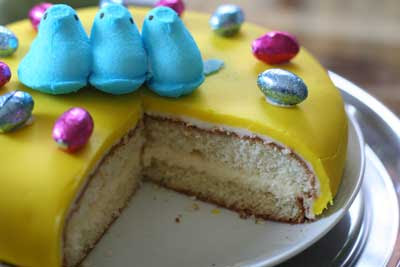
 United States
United States
 Anna Zoitas is founder and CEO of Seven Deuce Inc., a specialty food product company that includes
Anna Zoitas is founder and CEO of Seven Deuce Inc., a specialty food product company that includes 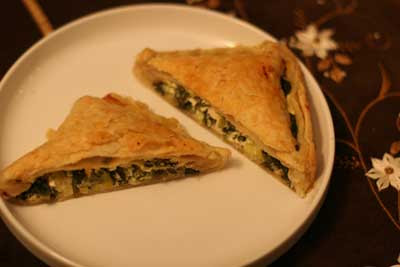
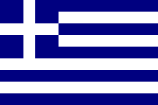 Greece [
Greece [  Although it may not look like it, Spring is here. Blackberries are in season in California starting in May. As such, I'm posting this recipe for blackberry pie so that you can take advantage of the fresh blackberries that will soon be available at markets.
Although it may not look like it, Spring is here. Blackberries are in season in California starting in May. As such, I'm posting this recipe for blackberry pie so that you can take advantage of the fresh blackberries that will soon be available at markets.

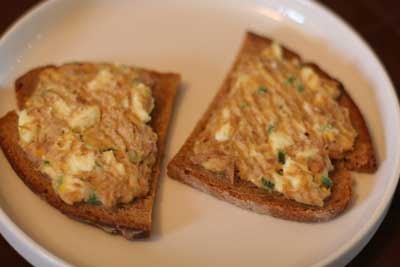 I had some left over hard boiled eggs and an assortment of condiments in the refrigerator last weekend, so I decided to use them to make tuna crostini, a classic Italian snack. I used 3 pieces of Dimpflmeier Klosterbrot Rye Bread basted with olive oil as the base. The end result was an easy to make snack that only took about 20 minutes to prepare. Here's how to do it:
I had some left over hard boiled eggs and an assortment of condiments in the refrigerator last weekend, so I decided to use them to make tuna crostini, a classic Italian snack. I used 3 pieces of Dimpflmeier Klosterbrot Rye Bread basted with olive oil as the base. The end result was an easy to make snack that only took about 20 minutes to prepare. Here's how to do it: Italy
Italy
 During my interview with
During my interview with 
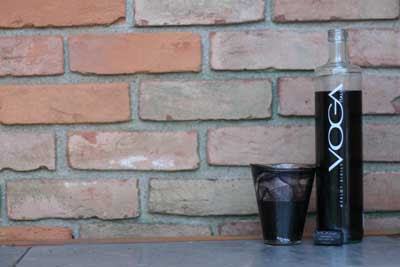


 Tzatziki is used as a sauce with souvlaki or gyros. It can also be served as a dipping sauce with bread. It is light and creamy with a subtle cucumber flavor and goes well with most grilled meats.
Tzatziki is used as a sauce with souvlaki or gyros. It can also be served as a dipping sauce with bread. It is light and creamy with a subtle cucumber flavor and goes well with most grilled meats.
 Greece [
Greece [ 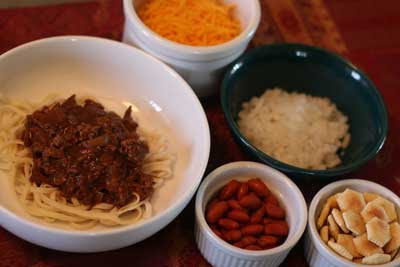 Cincinnati Chili is different from most types of chili in that it contains the unlikely ingredients of cocoa and cinnamon. These two ingredients give it a most unique color and taste that you have to experience. This recipe for Cincinnati Chili will provide you with the opportunity to try this style of chili without actually ever having to visit the Queen City.
Cincinnati Chili is different from most types of chili in that it contains the unlikely ingredients of cocoa and cinnamon. These two ingredients give it a most unique color and taste that you have to experience. This recipe for Cincinnati Chili will provide you with the opportunity to try this style of chili without actually ever having to visit the Queen City. United States
United States 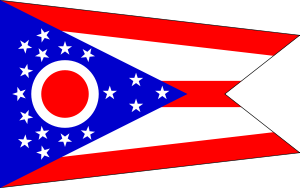 Ohio
Ohio
 Last month we went to two fish frys at two different churches in our neighborhood. For those of you not familiar with the Lenten tradition, the menu at these fish fries is pretty standard regardless of which church you attend. An entree of
Last month we went to two fish frys at two different churches in our neighborhood. For those of you not familiar with the Lenten tradition, the menu at these fish fries is pretty standard regardless of which church you attend. An entree of  Netherlands
Netherlands
 Fish and Chips is England's most famous dish. There is nothing better on a cold and cloudy day than a few pieces of deep fried whitefish on a bed of crispy chips (
Fish and Chips is England's most famous dish. There is nothing better on a cold and cloudy day than a few pieces of deep fried whitefish on a bed of crispy chips ( England
England
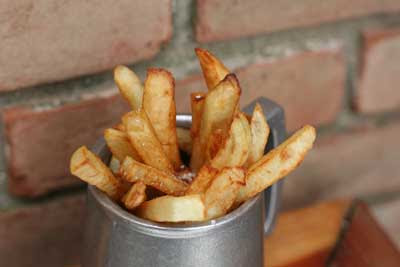 French fries, pommes frites, or Chips - whatever you want to call them, the key to making them well is all about the frying method. Of course you should use the freshest Idaho potatoes available. But when you fry them, the key is to blanch the fries at a lower temperature first in order to cook the fries through. Then you fry them again at a higher temperature to give the fries a golden color and a crispy texture.
French fries, pommes frites, or Chips - whatever you want to call them, the key to making them well is all about the frying method. Of course you should use the freshest Idaho potatoes available. But when you fry them, the key is to blanch the fries at a lower temperature first in order to cook the fries through. Then you fry them again at a higher temperature to give the fries a golden color and a crispy texture.


 Farfel comes from the Middle High German word
Farfel comes from the Middle High German word  Germany
Germany
